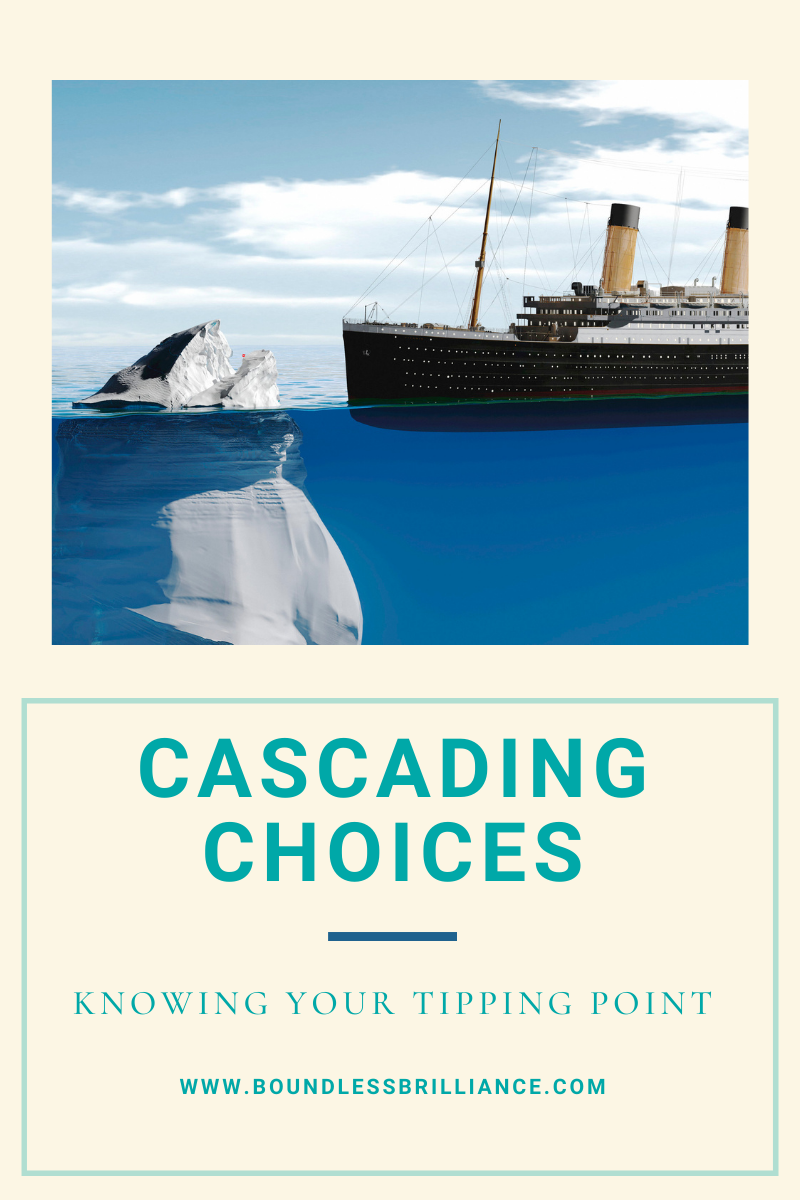Cascading Choices: Knowing Your Tipping Point

This year will mark the 110 year anniversary of the sinking of the RMS Titanic. We're all familiar with the story, but in case it's been a while, here's a quick recap.
The Titanic, which was marketed as 'the unsinkable ship,' was making her maiden voyage from her home port in Southhampton, England, and after quick stops in France and then Ireland, was steaming across the north Atlantic towards New York City.
In an effort to make port early, the Titanic was traveling at much faster speeds than advised, through iceberg-infested waters. The Titanic swiped an iceberg off the starboard side, rupturing five of the hull compartments on the bottom of the ship. These compartments were specifically designed to hold water in this event, allowing up to four compartments to take on water without compromising the ship. But the engineers forgot a vital detail - the compartments were not capped at the top. As these five compartments filled, and began to pull the ship vertical. This caused a cascade effect as the water filled each compartment, continuing to flow down and fill each successive compartment as the ship was pulled completely vertical. The unsinkable ship then split in half, finally sinking in the early hours of April 15th, 1912.
So what does the Titanic have to do with our choices as leaders? Honestly, there's a lot of meat in this situation.
You have an experienced 'Millionaire's captain,' Edward Smith, who gave in to social pressure from the wealthy socialites on board to make history instead of sailing safely.
You have a shipbuilder, Thomas Andrews, who was ignored by the White Star owners when he asked for more lifeboats to be placed on the decks. They told him it would make the deck appear "too cluttered."
You have sailors in the crow's nest, watching for icebergs, that forgot their binoculars.
You have musicians who chose to play their instruments in the face of certain death to calm the people in their last moments.
We could even get philosophical, and talk about the fact that the iceberg, or the immediate problem, appeared much smaller because the majority of the problem was not visible.
So. Much. Meat.
What I'd like to focus on in this article, however, are the compartments of the ship itself, and what they can demonstrate for us about what I'd like to call "tipping point habits."
Like the water cascading through each compartment, a tipping point habit is a habit that creates a cascade effect. Take, for instance, turning on your coffee pot in the morning.
You know if you turn on your coffee pot before you go into the bathroom to do your morning routine, by the time you get out, you will have fresh hot coffee ready and waiting for you. This precious first cup of coffee will then be enjoyed while you watch the morning news and make your lunch. Then, if you're like me, maybe you refill the cup of coffee, and return to your room to get dressed, do your makeup, and get ready for the day. When you come back into the kitchen, you're dressed, ready for the day, and rinse out the coffee cup and put it in the sink or dishwasher.
It's a whole series of actions, which cascade naturally from the one act of turning on your coffee pot.
We all have these tipping point habits, and the more we can recognize them for what they are, the more power we have to change our daily routine, and therefore our lives.
Take a friend of mine, for instance. She keeps an extra pair of gym shoes in her office, and keeps them where she can see them. Every day at lunch, she grabs out her gym bag, then she closes her door, changes into workout clothes, and puts on her gym shoes.
Then, regardless of the weather, she trucks outside for a walk, or across the street to the gym. She later confided in me that she discovered, over time, that she had to have her gym bag opened before she closed her door to change.
"Otherwise, it's super easy to just put the bag on my desk, tell myself I'm just jumping on social media real quick, and then I'll go for my walk."
What happens, more often than not, though, is that 'quick check' turns into reading through articles, opening a book, or mindlessly scrolling until she realizes her lunch hour is nearly up.
"If I open my bag, I know others can see me opening my bag to change and go workout. I know probably no one cares or even notices, but that little piece of accountability keeps me going through with getting changed and going to do my workout, even if I don't want to at the moment."
So how do you find your tipping point habits? You can find them by identifying the routine that follows after them.
Like pushing the button on the coffee pot. If I don't push the button before I go to the bathroom, it throws my whole routine off. If my friend doesn't open her bag, she knows she's not going to go exercise and she's going to feel the energy lag all afternoon.
If you're still not sure, ask your family members or partner. I promise, they're going to know!
Let's talk about it! Head over to one of my social platforms, and tell me what your tipping points are!

